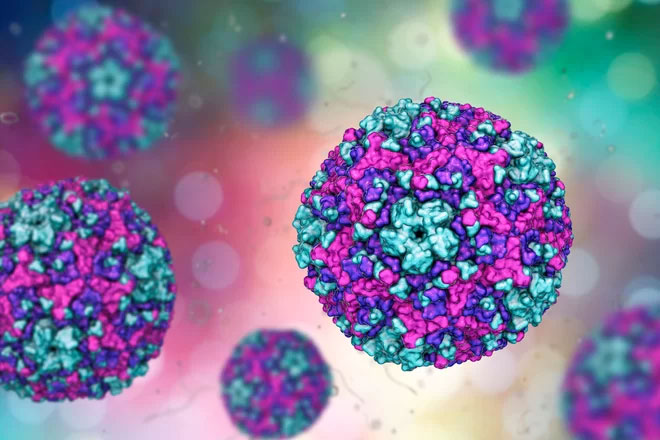The virus causes mild illness in adults, but the fetus has a heart defect
Research results show that a common virus that causes only mild symptoms in adults can lead to heart defects in the fetus during development.
A study of viral strains called coxsackievirus B * has previously been shown to be the cause of miscarriage in early pregnancy. Doctors questioned the harms of coxsackievirus B on the fetus. (Another form of this virus is coxsackievirus A, which causes human hand, foot and mouth disease.)
During the annual meeting of the American Heart Science Association, the scientists presented new findings about heart defects in the fetus associated with the coxsackie B virus during pregnancy in women.

Heart defects in the fetus have been associated with coxsackie B virus during pregnancy in women.
"Coxsackievirus B is a very common virus that affects adults, and they can cause problems during playback ," said Vipul Sharma, a postdoctoral fellow at the University of Washington surgery. development in the fetus ". He notes, "In adults, the symptoms of Coxsackievirus B are usually mild, sometimes with more severe symptoms such as myocarditis, but these cases are quite rare."
To learn about the effects of Coxsackievirus B on the fetus, researchers began conducting experiments in mice.
In the first phase, the researchers injected different strains of the virus at different times in pregnant mice.
Up to 60% of pregnant mice infected with the virus cause heart defect formation in pups, of which the most common are ventricular septal defect. In humans, this is also one of the most common disabilities. Ventricular septal defect is when on the heart wall - the wall that prevents the left ventricle and the right ventricle - appears a hole. This partition prevents oxygen-reducing blood from mixing with oxygen-carrying blood, but if the hole in the septum is too large, the blood mix will cause the body to not receive enough oxygen-containing blood.
The team found that infected mice in the "early stages of pregnancy" risk developing the highest heart defects. Therefore, the time of infection is also very important.
"Coxsackievirus works by binding to Coxsackie-Adenovirus Receptor (CAR) virus, " Sharma said. "They are found in the fetal heart and brain." Although the presence of this receptor prevents the virus from infecting the body, research has shown that without it, mice cannot survive. It is not clear what role this receptor plays in the body, but they are very important in linking cells together during development.
Next, Sharma and his team looked at how genes work on infected mice. They hypothesized that viruses cause heart defects by turning on genes that increase proteins that inhibit fetal heart cell formation and development.
Currently, this study has been completed in mice, most of which can be shown in humans. Sharma believes: "humans are more complex than mice - and in fact, mice are tested in a controlled environment, but humans do not."
But to show that mouse experiments are clinically significant, researchers need to look at humans.

The virus needs receptors in the fetal heart, so the virus can cause heart infections in children and adults.
In the second phase, the team took blood from 270 pregnant women at different times of pregnancy to see if women had antibodies to fight the virus in the blood. (Having antibodies means that the woman has been infected with the virus). After birth, the researchers found that people with high levels of antibodies in the blood were those who had children with high heart defects.
According to Dr. Amesh Adalja, a senior scholar at the Johns Hopkins Medical Security Center in Baltimore, he was not directly involved in the study, saying that "it is more likely that the virus is related to the disease." Congenital heart". The virus needs receptors in the fetal heart, so the virus can cause heart infections in children and adults.
However, Adalja said that studies in mice have shown a causal relationship between viruses and heart defects, but for people who need more data. Because coxsackievirus is very common, many people may have antibodies against this virus in the blood. Researchers need more data on the levels of these antibodies and whether they occur more frequently in pregnant women with children with birth defects compared to those without antibodies, so "More tests are needed to prove this is the cause of the disease."
For pregnant women, Sharma recommends caution. People can get infections through dirty food. Note to keep yourself clean to prevent disease. For example, "wash your hands and clean food properly before eating".
* Coxsackie B is a group of six serotypes of Coxsackievirus, mild stomach pain virus to pericarditis and myocarditis (Coxsackievirus causes cardiomyopathy).
- The man has a heart in the abdomen
- 1918 virus replication to prevent the current influenza epidemic
- Genetic defect makes brain size small
- Fix heart defects within 20 minutes
- 'Divine illness' of the Caesar emperor
- Cardiac muscle cells are always innovative in adults
- Common questions when Zika virus spread in Saigon
- The caveman virus can increase the birth rate of boys
- Zika virus detection causes brain disorders in adults
- The fetus also knows how to yawn
- H5N1 virus can be transmitted from mother to fetus
- Unexpected signs of warning of 5-minute illness kill 300 people
 Why do potatoes have eyes?
Why do potatoes have eyes? 'Tragedy' the world's largest carnivorous life: Death becomes ... public toilet
'Tragedy' the world's largest carnivorous life: Death becomes ... public toilet Tomatoes were once considered 'poisonous' for 200 years
Tomatoes were once considered 'poisonous' for 200 years Detecting microscopic parasites on human face
Detecting microscopic parasites on human face